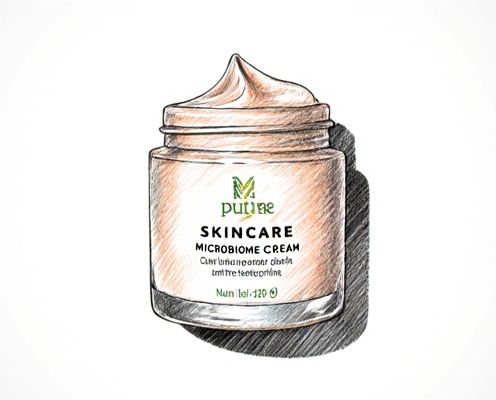
Microbiome cream Illustration
Microbiome cream supports the skin's natural barrier by nourishing beneficial bacteria and restoring balance to the microbiota. This innovative skincare product helps reduce irritation, redness, and sensitivity while promoting hydration and overall skin health. Regular use can enhance the skin's resilience, leading to a clearer and more radiant complexion.
Understanding the Skin Microbiome: The Foundation of Healthy Skin
The skin microbiome consists of trillions of beneficial bacteria, fungi, and viruses that maintain skin barrier function and protect against pathogens. Microbiome creams support this delicate balance by nourishing and restoring the natural flora, promoting hydration and reducing inflammation. Understanding the skin microbiome's crucial role enables targeted skincare formulations that enhance overall skin health and resilience.
What is Microbiome Cream? An Introduction
Microbiome cream is a skincare product formulated to balance and support the skin's natural microbiota by incorporating prebiotics, probiotics, and postbiotics. It promotes healthy skin barrier function, reduces inflammation, and helps protect against environmental stressors by maintaining microbial diversity. This innovative approach targets the root causes of skin issues such as dryness, sensitivity, and acne through microbiome-friendly ingredients.
Key Benefits of Using Microbiome Cream in Skincare
Microbiome creams help restore and maintain the skin's natural balance by supporting beneficial bacteria, which enhances the skin's protective barrier against environmental stressors. These creams reduce inflammation and sensitivity, promoting smoother, healthier, and more resilient skin. Regular use can improve hydration levels and minimize issues like redness, acne, and dryness, contributing to overall skin wellness.
Top Ingredients Found in Microbiome Creams
Key ingredients commonly found in microbiome creams include prebiotics like inulin and fructooligosaccharides (FOS), which nourish beneficial skin bacteria and promote a balanced microbiome. Probiotics such as Lactobacillus ferment and Bifida ferment lysate help reinforce the skin's natural barrier and reduce inflammation. Other notable components are ceramides and niacinamide, which support skin hydration and repair while maintaining optimal conditions for microbiome health.
How Microbiome Cream Supports Skin Barrier Function
Microbiome cream fortifies the skin barrier by balancing beneficial bacteria, which helps protect against environmental aggressors and reduces inflammation. It enhances lipid production, promoting moisture retention and improving skin resilience. Supporting the natural microbiota, this cream strengthens the skin's defense mechanisms, resulting in healthier, more balanced skin.
Microbiome Cream for Sensitive and Problematic Skin
Microbiome cream for sensitive and problematic skin supports the natural balance of your skin's microbiota, reducing inflammation and redness while enhancing the skin barrier function. Formulated with prebiotics and probiotics, it nourishes beneficial bacteria to protect against irritants and promote healing. Regular use helps soothe sensitivity and prevent breakouts, making your skincare routine more effective and gentle.
Comparing Microbiome Cream to Traditional Moisturizers
Microbiome cream supports the skin's natural barrier by promoting beneficial bacteria, unlike traditional moisturizers that primarily provide surface hydration. It helps balance the skin's microbiota to reduce inflammation and improve overall skin health, offering long-term benefits beyond temporary moisture retention. Scientific studies indicate microbiome creams enhance skin resilience and comfort, outperforming conventional formulations in maintaining healthy skin flora.
Evidence-Based Effects of Microbiome Cream on Skin Health
Microbiome creams enhance skin health by restoring the natural balance of beneficial bacteria, which supports the skin's barrier function and reduces inflammation. Clinical studies demonstrate that these creams decrease redness, irritation, and improve hydration by promoting a diverse and stable skin microbiota. Evidence-based research highlights their role in managing conditions like eczema and acne through modulation of microbial communities.
How to Incorporate Microbiome Cream into Your Skincare Routine
Incorporate microbiome cream into your skincare routine by applying it after cleansing and toning to maintain the skin's natural balance and promote healthy bacteria growth. Use a pea-sized amount to gently massage the cream into your face and neck, allowing it to absorb fully before applying sunscreen or makeup. Consistent use morning and night supports your skin's barrier function and enhances hydration for a radiant complexion.
Choosing the Best Microbiome Cream: Tips for Women
Selecting the best microbiome cream involves examining ingredients like prebiotics, probiotics, and skin-supporting antioxidants that promote a balanced skin flora. Women should prioritize formulations free from harsh chemicals and fragrances to prevent irritation and maintain healthy microbial diversity. Opt for products clinically tested for sensitive skin and containing moisturizing agents such as hyaluronic acid to enhance hydration and barrier function.
 womendy.com
womendy.com